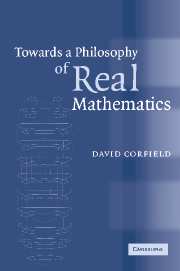Book contents
- Frontmatter
- Contents
- Preface
- 1 Introduction: a role for history
- PART I HUMAN AND ARTIFICIAL MATHEMATICIANS
- PART II PLAUSIBILITY, UNCERTAINTY AND PROBABILITY
- PART III THE GROWTH OF MATHEMATICS
- 7 Lakatos's philosophy of mathematics
- 8 Beyond the methodology of mathematical research programmes
- 9 The importance of mathematical conceptualisation
- PART IV THE INTERPRETATION OF MATHEMATICS
- Appendix
- Bibliography
- Index
7 - Lakatos's philosophy of mathematics
Published online by Cambridge University Press: 22 September 2009
- Frontmatter
- Contents
- Preface
- 1 Introduction: a role for history
- PART I HUMAN AND ARTIFICIAL MATHEMATICIANS
- PART II PLAUSIBILITY, UNCERTAINTY AND PROBABILITY
- PART III THE GROWTH OF MATHEMATICS
- 7 Lakatos's philosophy of mathematics
- 8 Beyond the methodology of mathematical research programmes
- 9 The importance of mathematical conceptualisation
- PART IV THE INTERPRETATION OF MATHEMATICS
- Appendix
- Bibliography
- Index
Summary
INTRODUCTION
Nearly forty years have passed since Imre Lakatos published his paper Proofs and Refutations over four successive issues of the British Journal for the Philosophy of Science. Two years after his untimely death in 1974, these articles, along with other sections of his doctoral thesis, were published as a book (Lakatos 1976). It was only then that (generally favourable) reviews of his work appeared, among them notably one by Quine (1977). Uncharacteristically for a piece of philosophy of mathematics written in the latter half of the twentieth century, even mathematicians appeared to enjoy it. Davis and Hersh (1981: 347), themselves mathematicians, maintain that before it appeared in book form it was a ‘sort of underground classic among mathematicians, known only to those intrepid souls who ventured into the bound volumes of the British Journal for the Philosophy of Science’. And yet, despite receiving praise from mathematicians and positive reviews from philosophers, very few attempts have been made to build on Lakatos's ideas.
I shall begin by assessing the later Lakatos's portrayal of the way mathematical theories develop. Then, after defending him from a number of criticisms that have been aimed at his work, I shall be arguing later in this chapter that Lakatos was overly concerned with questioning the status of the accepted statements of an established mathematical theory, and that accordingly he did not pay sufficient attention to its more conceptual features, including its relationships with other theories, an imbalance which was not so noticeable in his treatment of informal theories, but which emerges quite plainly when he touches on modern mathematics.
- Type
- Chapter
- Information
- Towards a Philosophy of Real Mathematics , pp. 151 - 174Publisher: Cambridge University PressPrint publication year: 2003



